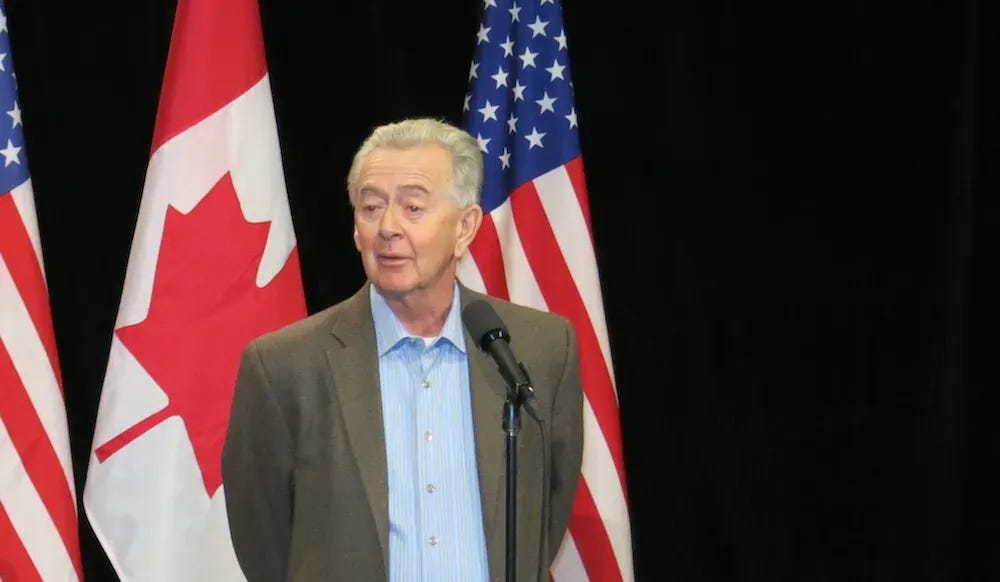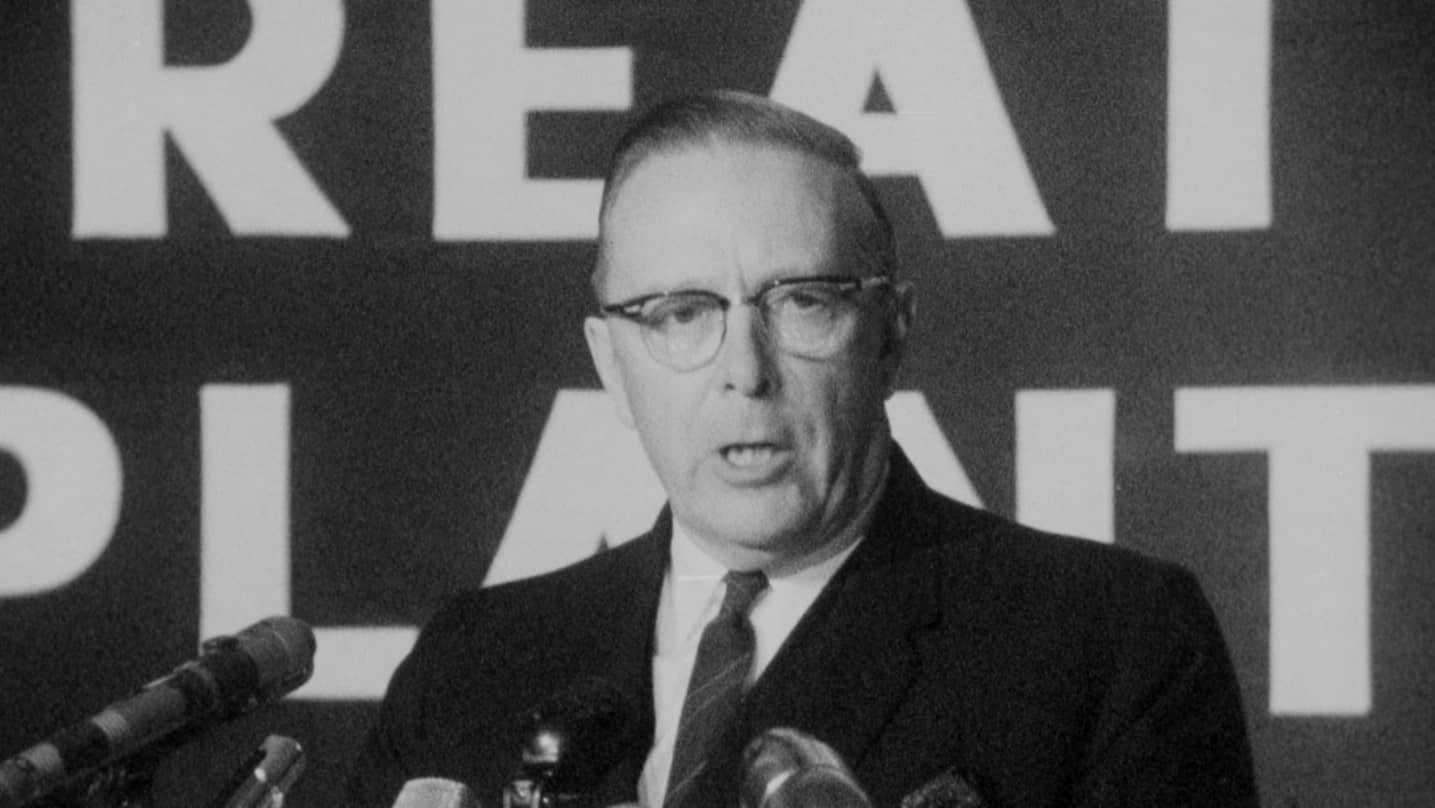Preston Manning enters the chat
Conservative movement grandfather reemerges with grumpy separatist threats
First, take a look at the price of oil: If there’s one number always on the minds of Alberta’s political leaders, it’s the price of oil - and the price of West Texas Intermediate (WTI) to be exact.
The Government of Alberta relies heavily on oil and gas royalty revenues to fund the day to day operations of government (it’s why personal and corporate taxes can be so low in Alberta) and those royalty revenues are tied to the price of what a barrel of WTI oil is selling for. The provincial budget tabled by Finance Minister Nate Horner earlier this year projects the price of WTI at $68/barrel, a full $8 more than what it was priced at this morning.
The sharp drop in the price of WTI after US President Donald Trump announced wide-ranging and random tariffs on products entering his country will come as a shock to Alberta’s political leaders, especially after Premier Danielle Smith declared Trump’s tariffs to be a big win for Alberta and Canada.
Preston Manning enters the chat
Conservative movement grandfather emerges from political retirement with grumpy separatist threats

Preston Manning emerged from political retirement to insert himself into the federal election mix by writing an op-ed in the Globe & Mail claiming that Liberal Party leader Mark Carney poses a threat to national unity. Manning’s argument triangulates with Premier Danielle Smith’s threats that a re-elected Liberal government would lead to an “unprecedented national unity crisis” - claims that are likely not very helpful for Pierre Poilievre’s Conservatives.
Manning is undoubtably frustrated by the Liberal Party’s resurgence in public support but threatening that the country will be torn apart if the Conservatives don’t win the election is a shameful bookend to his long and fascinating career in Albertan and Canadian politics.
But who’s Preston?
Manning is probably a familiar name to a lot of Daveberta readers but, now that he’s been out of elected office for more than two decades, there’s a good chance that even a few keen politician watchers in 2025 aren’t too familiar with him.
The Premier’s son
When you first heard Preston Manning’s name likely depends on your vintage.
Older political watchers might have first heard his name when it was associated with his famous father, Ernest Manning, who served as Premier of Alberta from 1943 to 1968. The elder Manning became leader of the Social Credit Party after the unexpected death of Premier William Aberhart. When he was sworn-in at the age of 35, the elder Manning became the youngest first minister in the British Commonwealth since William Pitt the Younger became prime minister of Great Britain in the late 18th century.
The junior Manning was the Dauphin of Alberta politics under his father’s tutelage, as a frequent guest on his father’s weekly bible hour radio program and being tasked in his early 20s to co-author a major government white paper on human resources management.
Manning was touted by some political watchers as a possible successor to the Premiership when the elder Manning retired in 1968.
“Preston Manning, 25, doesn’t sit in the Alberta Legislature, yet as an advisor to his famous father, he carries considerable weight in Alberta government affairs.” - Calgary Herald editorial on July 27, 1968.
“The only dark horse who could have any important effect on the outcome seems to be Preston Manning. Mr. Manning, Jr., would enjoy a good deal of support from the name alone and has already demonstrated considerable ability, though not, possibly, on a level with those who are also contesting the leader’s mantle. On the other hand, he was literally born in an atmosphere of politics, of legislation, of party building and vote getting.” - Daily Herald-Tribune editorial on December 3, 1968.
But fate had different plans for the junior Manning. He did not run for the leadership of the Social Credit Party when his father retired, though it would have been a fascinating “what-if” scenario to see him face Progressive Conservative leader Peter Lougheed in the 1971 election.
In his history of the Social Credit era, author John Barr suggests that the junior Manning might have been the only person who could have saved the Alberta dynasty. Instead, Lougheed defeated Premier Harry Strom and the 36-year long governing Social Credit Party was swept to the margins of Alberta politics.
While Manning didn’t run in the 1971 provincial election, he did cause a bit of a political storm for his party when he suggested that a national committee studying the creation of a Canadian constitution include a mechanism for provinces to separate from Canada. Manning warned that a lack of legal mechanism for secession could lead to tragic civil disorder, according to reports from the Canadian Press on June 9, 1971.
Lougheed described Manning’s secession suggestion as a “Social Credit proposal” and Alberta NDP leader Grant Notley claimed Manning’s statement “feeds the fires of Western alienation by raising academic questions about the right of secession.”
Manning kept a foot in politics over the next two decades, speaking about faith and public service at evangelical churches across the province, supporting Werner Schmidt’s bid to lead the Socreds after the party’s 1971 defeat (Schmidt would later serve as the Reform Party MP for Kelowna) and, in 1979, helping found the Movement for National Political Change political education group.
One of the aims of Manning’s education group was to “radically transform one of the existing federal political parties or produce a new political party capable of displacing one or more of the existing entities.” That aim is what eventually led Manning to become a household name in Canada.
The Reform Party leader
Most political watchers will know Manning as leader of the Reform Party of Canada, a right-wing populist and social conservative party that adopted “the West Wants In!” as its rallying cry.
In 1993, Manning’s Reform Party shattered the federal Progressive Conservative Party’s electoral hold on Western Canada. Manning served as the MP for Calgary Southwest from 1993 to 2002, during which time his Reform Party reshaped Canadian politics.
Despite huge success in Western Canada’s four provinces, the party was only ever able to reach Official Opposition status in Ottawa before it became clear the party’s chances of electoral success east of Manitoba were slim to none.
Manning was forced out of the leadership when he was defeated by Alberta cabinet minister Stockwell Day in the race for the leadership of the new Canadian Alliance party in 2000. Among Day’s supporters was current federal Conservative Party leader Pierre Poilievre and among Manning supporters was current Calgary Heritage Conservative MP Shuv Majumdar.
The Conservative Grandfather or Godfather?
Manning resigned as an MP in 2002 and reemerged not long after as the founder of the Manning Centre for Building Democracy (now known as the Canada Strong and Free Network (formerly the Manning Centre for Building Democracy)). Launched at the start of the Conservative Party’s electoral success under Prime Minister Stephen Harper, the Manning Centre operated as a networking, education, and training ground for Canada’s conservative movement.
Manning has since retired from the Manning Centre, but in 2019 he lent his political experience and credibility to Premier Jason Kenney’s Fair Deal Panel, which toured Alberta after the federal Liberals were re-elected in 2019. And in 2023, Manning left the leadership of the COVID-19 skeptical National Citizen’s Inquiry into the pandemic response in order to author the Smith government’s COVID-19 Public Health Emergencies Governance Review Panel final report. The final report earned significant criticism from public health professionals.
Depending on your political views, Preston Manning is either the Grandfather or the Godfather of Canada’s modern Conservative movement. But whatever your opinions of Manning, there is no doubt that he has played a big role in Albertan and Canadian politics over the past sixty years.
Side note: I met Manning once, at a reception at the University of Alberta after he was presented with an honourary degree (I might have even been on the University Senate Committee that recommended him for the honour). At the reception he was engaging and appeared sincerely interested in what the group of political science students I was with had to say about the university and Canadian politics. That day he was a far cry from the grumpy separatist rhetoric included in his Globe & Mail op-ed.
Does Danielle Smith know we can all see and hear her?
The answer to Shannon Proudfoot’s rhetorical question asked in the headline of her weekend Globe & Mail column is yes. Danielle Smith does know everyone can see and hear her - and that’s what she wants.
Going back to Smith’s campaign for the UCP leadership and the Sovereignty Act in 2022, a key part of her agenda depends on creating a political crisis in Canadian Confederation. Anyone writing about Alberta politics in 2025, especially Ottawa-based columnists, should read the Free Alberta Strategy that was co-authored by Rob Anderson, Barry Cooper, and Derek From. This document plays a big role informing Smith’s playbook for political chaos.
Federal party leaders come to Alberta
NDP leader Jagmeet Singh was in Edmonton last week to help shore up support for Trisha Estabrooks in Edmonton Centre. Conservative Party leader Pierre Poilievre is headlining a rally in south Edmonton tonight and I’m told that more than 11,000 people have RSVPed to the rally. There is word that Liberal Party leader Mark Carney is coming to Alberta later this week. The Liberals are optimistic that Carney’s bump in the polls could help them elect more MPs from Alberta.
Candidate updates
The deadline for parties to nominate candidates or for Independent candidates to put their names forward is today at 2:00 p.m. Here are some of the latest updates:
Former Edmonton-Ellerslie NDP MLA Rod Loyola was dropped by the federal Liberal Party days after he was announced as the party’s candidate in Edmonton Gateway. Loyola announced on Friday morning that he would run as an Independent candidate in the neighbouring Edmonton Southeast, but later switched back to Edmonton Gateway.
The Liberals named lawyer Jeremy Hoefsloot to replaced Loyola as their candidate in Edmonton Gateway. Hoefsloot was the Liberal Party’s candidate in Yellowhead in the 2019 federal election.
Former NDP MLA Stephanie McLean is running for the federal Liberals in the Esquimalt—Saanich—Sooke riding on Vancouver Island. McLean served as the NDP MLA for Calgary-Varsity from 2015 to 2019 and previously ran in the 2014 Calgary-Elbow by-election.
UCP staffer wins nomination in Edmonton-Strathcona
Darby Crouch defeated Emad El-Zein to win the United Conservative Party nomination in Edmonton-Strathcona. Crouch will run for the party in a by-election that needs to be called before the end of June 2025. She will face NDP leader Naheed Nenshi in the riding represented by former NDP leader Rachel Notley from 2008 to 2024.
Crouch has worked as Press Secretary to Minister of Agriculture and Irrigation RJ Sigurdson since September 2024 and previously worked as Director of Communications for the Sundre Pro Rodeo and Communications Coordinator for the Mustard Seed. She was Ministerial Assistant to the previous Minister of Environment and Parks in 2020.
“This is a pivotal time and I am committed to working hard to bring fresh ideas. I look forward to the journey ahead, engaging with all of you, and earning your trust to represent your interests,” Crouch wrote on LinkedIn when she announced her bid for the nomination.
The Alberta Party was scheduled to hold a candidate nomination vote on March 24 but the party has not released any information about their candidate.



I believe your introduction should read, " The Provincial Budget tabled by Finance Minister Nate Horner earlier this year projects the price of WTI at $68/barrel, a full $8 more than what it was priced at this morning. ---more rather than less
Umm, math is not my forté but I think your opening paragraph has an error about the price of WTI today versus the projection in the budget.